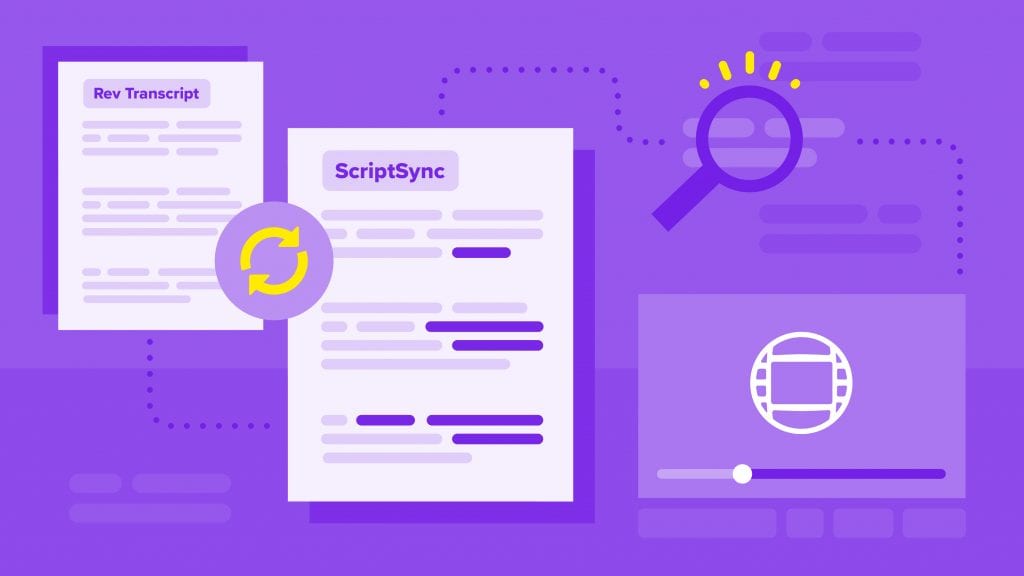How to Edit with ScriptSync Transcripts in Avid Media Composer
Script-based editing with Avid ScriptSync in Media Composer will help you search and find the best soundbites to edit video footage faster.

Script-based editing with Avid ScriptSync is a technique in the production industry where editors use scripts alongside their footage to quickly find the best takes for their selects sequence.
When it comes to video editing documentaries and other unscripted content, it can be difficult to quickly find the golden moments in your interviews and footage for your project.
Rather than spending hours scrubbing through video clips, you can transcribe your footage and use ScriptSync to quickly search the transcript text, select your clips, and assemble a sequence in Avid Media Composer.
In this guide, we’ll discuss how to get ScriptSync formatted transcripts of your video footage files to use in Avid Media Composer.
Get ScriptSync Transcripts From Rev
To use transcripts with your footage in Avid Media Composer, you’ll need them specifically formatted for ScriptSync. You can get access to transcripts in the ScriptSync format from Rev.com.
Order Transcription
To get ScriptSync-ready transcripts from Rev, have the video or audio footages files accessible on your local drive. Then, go to Rev.com and select the transcription service.
For the most accurate transcripts, we recommend the standard “human” option here. If your project has a smaller budget, however, we do offer the “automated” choice for quick and easy transcript generation, which you can access from our services drop-down menu at the top.
Once you’ve downloaded your footage files, click checkout and complete your order.
When you receive an email that the job is done, click on the link to open the order in the Rev Transcript Editor where you can edit and download your transcripts in the ScriptSync TXT file format.
Download the Transcript in ScriptSync Format
To download your ScriptSync-ready file in the Rev Transcript Editor, simply click the download button at the top right. Then, select ‘Avid ScriptSync’ from the Output Format window. Keep the file type as txt, and specify your export options (but keep in mind for ScriptSync purposes you generally don’t need timecodes or speakernames, but it shouldn’t hurt to include it if it helps you navigate your transcripts easier).
Import ScriptSync Transcript into Avid Media Composer
Now that you have your TXT file from Rev, open your project in Avid Media Composer and make sure you have all your footage files imported and ready to sync with your new transcript files.
To import your transcripts into Avid, click File, then New Script. Locate your TXT file(s) from Rev, and import your transcript.
Syncing the Transcript to the Footage
Click on your TXT file from the Bin window will open the script-based editing window. Going back to the Bin window, click-and-drag the video file you’d like to transcribe into the script-based editing window. This will populate a node within the window known as a “take” that will keep track of all your transcript information. In the Script Window, click and drag across the entire script and the inserted take. This will select everything you’d like to incorporate in ScriptSync.”
Now, highlight the script text and the take, then click “Script” and then “ScriptSync”. This will take you to the ScriptSync settings window, where you can select the audio tracks from which you’d like the transcript to base its script mark selections and define certain parameters for the script formatting. Once you’re ready to continue, click “OK”. ScriptSync will take some time to generate the script markers, but no other work is required to sync the files for script-based editing.
Searching the Text
Now that your footage and transcripts are synced, you can begin searching through the text to find the exact moment in your video footage.
In the Script-Based editing window, use the find function (CONTROL+F for PC or ⌘+F for Mac) to pull up the search bar. When you type in a keyword or phrase here, Avid will highlight where it occurs throughout the entire script, allowing you to easily navigate through dialogue and other spoken words in your transcript.
Pulling Selects
Now that you can easily find key moments in your footage with a simple word search, you can select the clips you want to use for your project. Clicking on any script mark will bring up a preview window showing the timecode at which the selected line of dialogue begins. From here, you can mark in- and out-points to then insert into your timeline.
If you’d like to select more than one take or shot for review, simply lasso the lines of dialogue (making sure to include their connected script marks), and click the Play button in the Script window. This will queue each take for the desired number of lines in the preview window, allowing you to view and select the best take.
Splicing Workflow
Once you get comfortable with this script-based editing workflow in Avid, you can perform advanced techniques like splicing in words or phrases from different takes to make sentences in your interview flow better. To splice in another audio bite from another take, you can do so by clicking on the script, searching for whatever word you’d like to replace, finding a better delivery of the word, opening it in the preview window, and inserting it into the desired section of your timeline.
Editing Text in the Script
If you’d like to edit the text in the transcript, click the “Edit Script Text” button in the toolbar before making your desired changes. ScriptSync will automatically tailor script markers to match any and every edit you make, creating a hassle-free workspace in which you can perfect your script.
Script-based Editing with AVID + Rev
With ScriptSync-ready transcripts from Rev, you can edit videos faster in Avid Media Composer.
Subscribe to The Rev Blog
Sign up to get Rev content delivered straight to your inbox.



